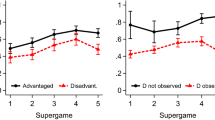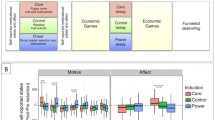Abstract
Participants in laboratory games are often willing to alter others' incomes at a cost to themselves, and this behaviour has the effect of promoting cooperation1,2,3. What motivates this action is unclear: punishment and reward aimed at promoting cooperation cannot be distinguished from attempts to produce equality4. To understand costly taking and costly giving, we create an experimental game that isolates egalitarian motives. The results show that subjects reduce and augment others’ incomes, at a personal cost, even when there is no cooperative behaviour to be reinforced. Furthermore, the size and frequency of income alterations are strongly influenced by inequality. Emotions towards top earners become increasingly negative as inequality increases, and those who express these emotions spend more to reduce above-average earners' incomes and to increase below-average earners' incomes. The results suggest that egalitarian motives affect income-altering behaviours, and may therefore be an important factor underlying the evolution of strong reciprocity5 and, hence, cooperation in humans.

Similar content being viewed by others
References
Fehr, E. & Gächter, S. Altruistic punishment in humans. Nature 415, 137–140 (2002)
Andreoni, J., Harbaugh, W. & Vesterlund, L. The carrot or the stick: rewards, punishments, and cooperation. Am. Econ. Rev. 93, 893–902 (2003)
Sefton, M., Shupp, R. & Walker, J. The effect of rewards and sanctions in the provision of public goods. Center for Applied Economics and Policy Research Working Paper 2006–005, 1–43 (2006)
Fowler, J. H., Johnson, T. & Smirnov, O. Egalitarian motive and altruistic punishment. Nature 433 E1 doi: 10.1038/nature03256 (2005)
Fehr, E., Fischbacher, U. & Gächter, S. Strong reciprocity, human cooperation, and the enforcement of social norms. Hum. Nat. 13, 1–25 (2002)
Maynard Smith, J. & Price, G. The logic of animal conflict. Nature 146, 15–18 (1973)
Bergstrom, C. T. & Lachmann, M. Signaling among relatives. III. Talk is cheap. Proc. Natl Acad. Sci. USA 95, 5100–5105 (1998)
Fehr, E. & Schmidt, K. M. A theory of fairness, competition, and cooperation. Q. J. Econ. 114, 817–868 (1999)
Bolton, G. & Ockenfels, A. ERC: A theory of equity, reciprocity, and competition. Am. Econ. Rev. 90, 166–193 (2000)
Falk, A. & Fischbacher, U. A theory of reciprocity. Games Econ. Behav. 54, 293–315 (2006)
Falk, A., Fehr, E. & Fischbacher, U. Driving forces behind informal sanctions. Econometrica 73, 2017–2030 (2005)
Orne, M. T. On the social psychology of the psychological experiment: With particular reference to demand characteristics and their implications. Am. Psych. 17, 776–783 (1962)
Bosman, R. & van Winden, F. Emotional hazard in a power-to-take experiment. Econ. J. 112, 147–169 (2002)
Xiao, E. & Houser, D. Emotion expression in human punishment behaviour. Proc. Natl Acad. Sci. USA 102, 7398–7401 (2005)
Acknowledgements
We thank the Center for Adaptive Behaviour and Cognition at the Max Planck Institute for Human Development and the UC Davis Institute of Government Affairs for generous research support.
Author Contributions The authors are listed alphabetically because each author contributed equally to the design, implementation, analysis and communication of this research.
Author information
Authors and Affiliations
Corresponding author
Ethics declarations
Competing interests
Reprints and permissions information is available at www.nature.com/reprints. The authors declare no competing financial interests.
Supplementary information
Supplementary Methods
This file contains Supplementary Methods. (PDF 81 kb)
Rights and permissions
About this article
Cite this article
Dawes, C., Fowler, J., Johnson, T. et al. Egalitarian motives in humans. Nature 446, 794–796 (2007). https://doi.org/10.1038/nature05651
Received:
Accepted:
Issue Date:
DOI: https://doi.org/10.1038/nature05651
- Springer Nature Limited
This article is cited by
-
The cognitive challenges of cooperation in human and nonhuman animals
Nature Reviews Psychology (2023)
-
Partner choice and cooperation in social dilemmas can increase resource inequality
Nature Communications (2023)
-
What drives conditional cooperation in public good games?
Experimental Economics (2023)
-
Social anxiety in modern societies from an evolutionary perspective
Discover Psychology (2023)
-
Disparities in the impacts of co-management on fishers’ livelihoods
Sustainability Science (2023)





